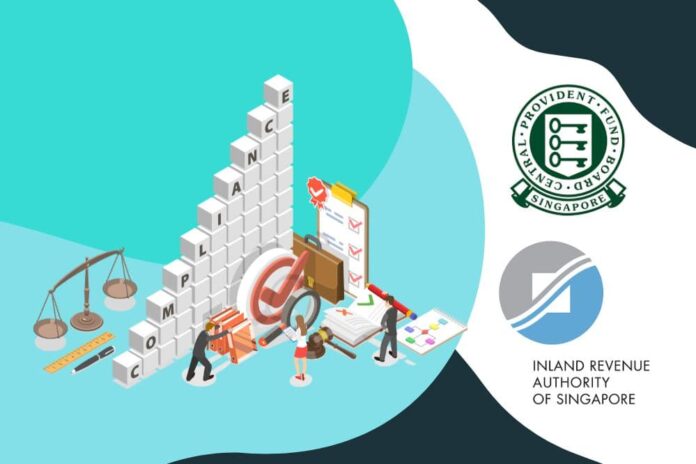In the intricate web of human resources management, few aspects are as critical and legally bound as payroll compliance. For businesses in Singapore, adhering to payroll regulations isn’t just a matter of good practice—it’s a legal obligation that ensures fair treatment of employees and shields organizations from potential penalties and legal troubles.
In this article, we’ll delve into the depths of payroll compliance, its importance, key requirements, and best practices.
What is Payroll Compliance?
At its core, payroll compliance encompasses the adherence to local, state, and federal laws and regulations governing employee compensation, deductions, taxes, and reporting requirements. In Singapore, payroll compliance involves strict adherence to the guidelines set forth by the Inland Revenue Authority of Singapore (IRAS) and other relevant authorities.
Why Payroll Compliance is Important?
- Legal Obligation: Compliance with payroll regulations is not just a matter of ethical practice; it’s a legal requirement mandated by Singaporean labor laws.
- Employee Trust and Morale: Ensuring accurate and timely payment builds trust and morale among employees, fostering a positive work environment.
- Avoidance of Penalties: Non-compliance can result in severe penalties, fines, and legal repercussions that can tarnish a company’s reputation and financial stability.
What You Need to Note for Payroll Compliance in Singapore?
- Tax Deductions and Contributions: Understand the tax rates, deductions, and contributions applicable to different types of employees, including locals, foreigners, and expatriates.
- CPF Contributions: Comply with the Central Provident Fund (CPF) contribution requirements for eligible employees, including accurate calculation and timely remittance.
- Statutory Requirements: Stay abreast of statutory requirements such as annual leave, public holidays, and overtime pay, ensuring compliance with relevant regulations.
- Employee Records: Maintain accurate and up-to-date records of employee information, salary details, and employment contracts as mandated by Singaporean labor laws.
- Reporting Obligations: Fulfill reporting obligations to regulatory authorities such as the IRAS, submitting accurate and timely payroll reports and tax filings.
Key Requirements of Payroll Compliance
- Accuracy: Ensure precise calculation of salaries, deductions, and contributions to avoid discrepancies and potential legal issues.
- Timeliness: Process payroll and remit contributions within stipulated deadlines to prevent penalties and maintain employee satisfaction.
- Transparency: Communicate payroll policies, deductions, and contributions clearly to employees, fostering transparency and trust within the organization.
- Comprehensive Record-Keeping: Maintain detailed records of payroll transactions, employee data, and tax filings for auditing and compliance purposes.
- Continuous Education: Stay updated on changes to payroll regulations and tax laws, investing in ongoing education and training for payroll administrators.
5 Payroll Compliance Best Practices
- Invest in Automated Payroll Software: Leverage robust payroll software like OpensoftHR Payroll to automate calculations, deductions, and tax filings, minimizing errors and streamlining compliance processes.
- Regular Compliance Audits: Conduct regular audits of payroll processes and records to identify discrepancies, errors, and potential compliance issues.
- Employee Self-Service Portals: Implement self-service portals that empower employees to access their payroll information, tax documents, and leave balances, promoting transparency and reducing administrative burdens.
- Cross-Functional Collaboration: Foster collaboration between HR, finance, and legal departments to ensure alignment and compliance with payroll regulations and reporting requirements.
- Engage Professional Expertise: Consider engaging professional payroll consultants or outsourcing payroll functions to reputable providers with expertise in Singaporean payroll regulations and compliance requirements.
Do You Need a Payroll Compliance Practitioner?
While smaller to medium sized businesses may manage payroll compliance internally, larger organizations with complex payroll structures and regulatory requirements may benefit from dedicated payroll compliance practitioners. These professionals possess specialized knowledge of Singaporean labor laws, tax regulations, and compliance best practices, ensuring accurate payroll processing and adherence to legal requirements.
Conclusion
In conclusion, payroll compliance is not merely a box to check—it’s a fundamental aspect of responsible business operations that protects both employees and employers alike. By understanding the nuances of payroll regulations, implementing best practices, and investing in the right tools and expertise, Singaporean businesses can navigate the complexities of payroll compliance with confidence and integrity.
The majority of OpensoftHR’s customers are small medium businesses (with less than 1000 employees) in Singapore and OpensoftHR Payroll and HRMS software is good enough for their payroll compliance needs. Contact us for a free non-obligatory product demo today.
 Home
Home














